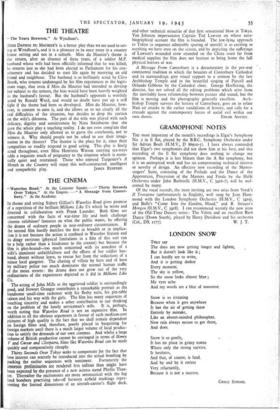" The Years Between." At Wyndham's.
THE THEATRE
MISS DAPHNE DU MAURIER'S is a better play than we are used to see- ing at Wyndham's, and it is a pleasure to be once more in a country house setting and not in a suburb. Miss du Maurier's theme is the return, after an absence of three years, of a soldier M.P. husband whose wife had been officially informed that he was killed; he returns just as she had been elected to Parliament for his con- stituency and has decided to start life again by marrying an old friend and neighbour. The husband is so brilliantly acted by Clive Brook, who returns undamaged by his film experiences to the legiti- mate stage, that even if Miss du Maurier had intended to develop her subject to the utmost, the bias would have been heavily weighted in the husband's favour. But the husband's opponent is worthily acted by Ronald Ward, and would no doubt have put up a stiff fight if the theme had been so developed. Miss du Maurier, how- ever, is content to state it, and she allows us to see clearly all the leg difficulties of the situation, but decides to drop the curtain on the wife's dilemma. The part of the wife was played with such delicacy, dignity and sensitiveness by Nora Swinburne that she gave the whole play a touching reality. I do not even complain that Miss du Maurier only allowed us to guess the conclusion, not to witness it. Why should people not be asked to use their imagi- nation in the theatre? The theatre is the place for it, since their sympathies so readily respond to good acting. This play is finely acted throughout, even Miss Henrietta Watson carrying tea-trays adds a requisite touch of poignancy to the situation which is essen- tially quiet and restrained. Those who enjoyed Turgeniev's A Month in the Country will enjoy this well-constructed, intelligent


























 Previous page
Previous page